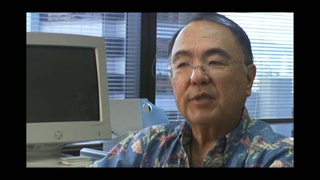Interviews
Reflecting on Japanese Americans' response to incarceration
I think they should have thought of things more. They shouldn't have felt guilty of being a Japanese. They should be proud that they're Japanese and express their feeling, and objected. If they had objected right in the beginning, maybe things like this may not have happened. Maybe something worse might have happened. Who knows? But, the first thing was, let's be obedient and find out what they're going to do to us because they said they're gonna take care of us. And we didn't know to what extent. But as it turned out, it was more like an internee in a concentration camp and when that comes about, you start thinking. And I thought that a lot of the people thought the way I did that this is not right, they're not treating me right so I'm going to rebel. And as I said, it surprised me that a lot of the people didn't think that way. 'Cause I don't feel guilty of what I did. I don't feel guilty that I'm, because I'm a Japanese. I'm an American citizen, born and raised, and you can't take that away from me as a citizenship.
Date: July 25, 1997
Location: Washington, US
Interviewer: Larry Hashima, Stephen Fugita
Contributed by: Denshō: The Japanese American Legacy Project.
Explore More Videos

Lack of political power led to camps
(1924-2018) Researcher, Activist


World War II hysteria against Japanese in New York City
(1924-2018) Researcher, Activist

His testimony has more credibility because of his race
(1922 - 2005) Former U.S. Army counterintelligence officer

Different tension between East Coast and Los Angeles
Japanese American Creative designer living in Japan

Being an American soldier and an "enemy alien"
(1923-2011) Lawyer, MIS veteran, founder of Francis and Sarah Sogi Foundation

Not relating to Japan Americans' experiences on the mainland
(1923-2011) Lawyer, MIS veteran, founder of Francis and Sarah Sogi Foundation


Less information about Hawai‘i in mainland
(b.1944) Founder of Kobayashi Group, LLC

First learning about the incarceration experience in college
(b. 1955) Lawyer

Feeling angry upon reading of Supreme Court case, 'Korematsu v. United States'
(b. 1955) Lawyer

Reasons for conformity and competitiveness in Gardena, California
(b. 1946) Lawyer


Thoughts on relationship between Japanese Peruvians and Japanese Americans at Crystal City, Texas
(1937 - 2021) Teacher

Japanese American railroad workers are fired following the bombing of Pearl Harbor
(b. 1923) Chick sexer
